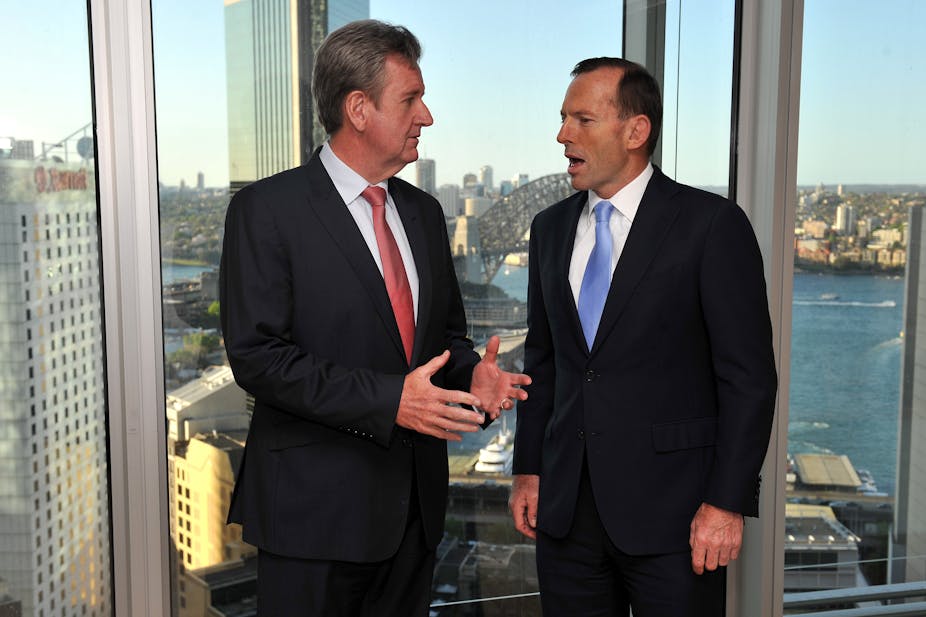Personality matters in Commonwealth-state relations. A change of leader always brings with it a different approach to managing the relationship between the jurisdictions that make up the Australian federation. Tony Abbott chairs his first COAG meeting on Friday in Canberra, and his approach will be markedly different from that of recent prime ministers such as Kevin Rudd or John Howard.
Abbott has come full circle on his views about Commonwealth-state relations. In his 2009 book Battlelines, Abbott declared the federation “Australia’s biggest political problem” and outlined his desire to abolish the states.
As prime minister, Abbott has updated that view. He has committed to rethinking the Commonwealth’s role in areas of subnational service delivery.
Rethinking federal-state roles
The announcement of the Commission of Audit flags the Abbott government’s intentions. Part of its brief is to review the split in roles and responsibilities between the different levels of government.
This is music to the ears of state premiers. They have been alarmed for some time about federal government incursion into policy areas under their jurisdiction.
This federal incursion has often been underpinned by complex and coercive funding agreements. The clumsy handling of education funding in the past fortnight was saved by Abbott before it spiralled into a dangerous early loss of political goodwill among conservative state premiers.
Abbott is in the fortunate position of having the partisan support of the major states at COAG. He understands, though, that partisan support comes second for premiers to that of being seen to advance the claims of their state. All premiers like to leave COAG with a “big win” to announce on their local evening news.
The split that will have the most impact on Abbott’s chairmanship of COAG is not partisan but ideological. Abbott will have to manage the ongoing tensions between the premiers.
The negotiations on the Gonski schools funding, firstly under Julia Gillard, then Kevin Rudd and latterly with Christopher Pyne, split the conservative states between those who signed up before the election and those who held out against the federal intrusion into this area of state service delivery. It will take all the new prime minister’s chairing skills to ensure this ill-will does not spill into other agenda items.

Refining the COAG agenda
What the premiers will agree upon is the need to reform the agenda and processes of COAG. Abbott inherited a large and unwieldy COAG agenda, still digesting the leftovers from Rudd’s “co-operative federalism”. First ministers have been bogged down in too much detail without having the time at the meetings to do justice to such a large agenda.
Abbott has committed to significantly streamlining the COAG agenda. The premiers will support him in changing the focus of the meeting to deal with the strategic issues facing the nation. Premiers from both sides of the political divide are agreed on the need to reform COAG into a truly federal body, not one controlled by the Commonwealth, with meetings and agendas set at the whim of the prime minister.
The premiers will also be interested in the terms of reference for the White Paper on the Reform of the Federation. They will wish to have input into this process before it is released next year. Their goodwill is largely dependent on Abbott keeping faith with them about his commitments to reform the federation.
To make a success of his first COAG meeting, Abbott will have to juggle the partisan, territorial and personality issues that generate the undercurrents of any COAG meeting. He will seek to reforge relationships with the Liberal premiers to ensure the early days of his prime ministership are not derailed by friendly fire.
Abbott will also want to set in motion a range of activities that demonstrate his genuine commitment to reconfiguring who does what in the Australian federation.
For their part, the premiers remain optimistic but cautious. They have witnessed the dissipation of opposition rhetoric of collaboration disappear into coercive Commonwealth behaviour before. They will need to be convinced that Abbott’s approach to COAG is not “business as usual”.

